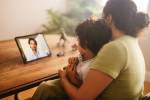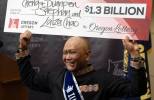Now what? After beating Cancer
Terri Johnson wanted to stay active after receiving her breast cancer diagnosis in 2005. She lived alone and was concerned about getting through the treatments. (The American Cancer Society recommends at least 30 minutes of exercise daily; exercising three or four times a week substantially decreases the likelihood of death from cancer.)
"I was searching for dragonboating," Johnson said. Dragonboating is an ancient Chinese sport involving a long and narrow canoe powered by a human team. Johnson's search led her to Team Survivor's national Web site. Team Survivor is a non-profit organization that promotes exercise among women with cancer. Johnson looked for a local chapter in Las Vegas and found nothing, so she started her own affiliate with two other women.
Johnson has since beaten breast cancer. She says her involvement with Team Survivor helped her during her treatments and continues to provide focus now that she is cancer-free.
As devastating as a cancer diagnosis can be, in many ways a cancer-free diagnosis can be just as disorienting. After devoting nearly all available time and energy to fighting the disease, sometimes for years, many patients find it difficult to adjust to a lifestyle in which cancer treatment is no longer a full-time job.
Megan Stiles was diagnosed with breast cancer in 2003. She remembers having trouble understanding what her doctor meant when he was reviewing her latest test results with her.
"He said ‘Your tests look good,' and started talking about follow-up care. I just remember thinking ‘What is he talking about?' I thought cancer treatments would go on for the rest of my life. I never expected this."
Stiles says she also wasn't sure what to expect from surviving cancer. "I knew I still didn't feel good," she said. "I had gained weight. I had no energy. I couldn't imagine being healthy."
"Healthy" can mean something completely different after a bout with cancer, and patients can sometimes have unrealistic expectations. Residual effects of chemotherapy can linger for a year or more. Fatigue is common. Radiation and surgery can leave substantial amounts of scar tissue and persistent pain. Cancer takes its toll, even when defeated.
Karen Milligan, a medical oncologist and director of Clinical Survivorship Services at the Nevada Cancer Institute in Las Vegas, says patients who have successfully completed their cancer treatment typically meet with a nurse practitioner to plan follow-up care.
"They plan out the next few years," Milligan said. "Screening, blood work, imaging." Patients work with a dietician, a wellness coordinator and a medical social worker to develop a comprehensive plan to improve their health, Milligan said.
Success leaves clues. Clinical Survivorship Services deals with breast cancer survivors because there are so many of them. Early detection, Milligan said, has greatly improved the odds of surviving breast cancer, so breast cancer survivors are meticulously studied to determine, among other things, what the longest-lived have in common. The odds of surviving colon cancer have also improved, and Milligan said Clinical Survivorship Services may begin working with survivors of that disease soon.
Fear of the cancer recurring can weigh heavily on cancer survivors. When in treatment, patients feel a measure of control. They can stay focused on taking action. But when the cancer cells are gone and the treatment stops, the energy that went into fighting the disease can turn into worry and dread.
Exercise and losing excess weight can be helpful, Milligan said.
"Often there is weight gain with breast cancer treatment," she said. Weight gain runs contrary to many people's expectations of cancer and its treatment, Milligan said, but it is common. A good exercise program can help restore a feeling of well-being in addition to improving physical health. It also makes it more likely that cancer survivors will live longer, according to the American Cancer Society.
This is a lesson Johnson has internalized. She knew instinctively that exercise and activity would help her to feel better. "I've always been active," she said. "But after cancer treatment, I could hardly get up off the couch. It's hard to get back to it. You're bald, you feel like crap, you're not a healthy person any more. I hired a personal trainer."
Johnson said Team Survivor members take regular walks together. Some of them also do running and swimming training, and some even go on to compete in triathlons. All of this helps in many ways, Johnson said, but she especially loves what she calls "the camaraderie of survivorship." She has since returned to work.
"It's the support of people who have been through what you've been through," she said. "Anyone who makes it through facing mortality, which can be a long and grueling process, is going to have a gratitude for life. Nothing is as bad as a cancer diagnosis."
Kelly Maxwell was also diagnosed with breast cancer in 2005. She was 27 years old, and had no family history of breast cancer. She said she had a pretty good idea of what was coming based on the concern her physicians had over the spot found on her mammogram, but she was still shocked.
"I spent about four hours breaking down, crying, but I never really fell into a serious depression," she said. "I just thought ‘OK, now what do we do?' And I made a plan. The Nevada Cancer Institute didn't exist then. Because of my age and the aggressive nature of the cancer, I wanted to go to the best place in the country."
Within two weeks of the diagnosis, Maxwell was in Houston being treated at MD Anderson. She was diagnosed cancer-free three years ago in February.
"I was much more scared after I finished treatment," Maxwell said. "I always thought I would recover, but when you're in treatment you're so focused on doctor appointments, being sick, being a patient, being treated like a sick person by everyone you know. It's a big adjustment."
Maxwell said she became depressed and worried about the cancer coming back.
"It took a long time to recover," she said. "I had a lot of fatigue, for about a year. I was taking two or three naps a day. I eventually became less scared, less fatigued. It never really goes away. It's a lingering feeling."
Maxwell recovered and went on to have a daughter, who will be two years old next month. She says she still feels some pain from surgery. "I still get tired," she said.
What advice would she give a cancer survivor?
"It gets easier," Maxwell said, "the further away you get from cancer."
Facts about cancer:
In the 1940s, an average of one in four cancer patients survived the disease.
Now, more people diagnosed with cancer are surviving each year.
The overall five-year survival rate for adults diagnosed with cancer from 1996 to 2003 is 65 percent.
On the Web:
Cancer Survivorship Facts and Resources
Cancer Survivorship Research, NCI
CDC Survivorship Fact Sheet
CDC Survivorship Road Map with Livestrong























